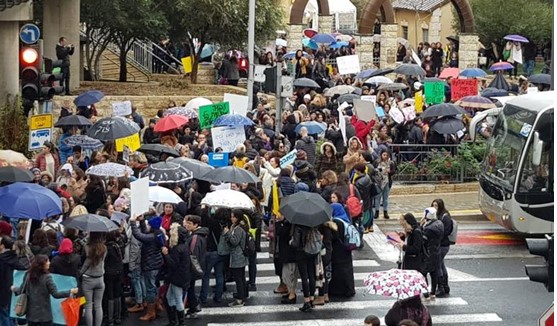Social workers’ resumed their sanctions against the state on Sunday, December 9, after a month during which they refrained from doing so while awaiting the results of negotiations between their representatives and the Finance Ministry.

Hundreds of social workers as they demonstrate and block Pal-Yam Street in Haifa, last Thursday, December 6. (Photo: Social Workers Union)
As of Sunday, all welfare services in Jerusalem were suspended indefinitely to exert pressure, on the Finance Ministry, as similarly happened beginning last Thursday, December 6, throughout northern Israel. The sanctions imposed by the social workers includes their not receiving the public during regular office hours; not writing up court reports; canceling all committees meetings investigating minors at risk; and closing centers for handling cases of domestic violence. On Sunday, hundreds of social workers demonstrated in the Jerusalem Light Rail Bridge near the western entrance to the city, while last Thursday they protested in front of the government compound in Haifa.
Social workers employed by the Education Ministry, National Insurance Institute, health system, hospitals, health funds, and mental health centers have joined in the work actions. The Histadrut declared a labor dispute two weeks ago and workers waited for that period of time elapse before beginning their actions.
Inbal Hermoni, the Social Workers Union chairwoman said that “following the indifference to the social workers’ demands by Finance Minister Moshe Kahlon and Welfare Minister Chaim Katz, all welfare services will be shut down from Kiryat Shmona to Hadera. If there won’t be a real solution to our work conditions, the pressure and the work, there won’t be any more social services in Israel.”
“Social services in Israel are not on the brink of a crisis, they are already deeply in a crisis. Hundreds of existing positions in the local authorities’ welfare departments go unfilled for a year or two because of the poor working conditions and low wages,” she added. “Social workers have to be able to make a decent living and not be punching bags.”


